News 2023
The aim of the CaixaResearch Health Research 2023 call was to promote biomedical research of excellence with a high social impact in basic, clinical and translational research.
The call, to which 493 proposals were submitted this year, is particularly aimed at addressing health challenges such as infectious diseases, neurosciences, cardiovascular and related metabolic diseases and oncology.
In this call, a project led by the researcher Juan Pedro Bolaños, from the Institute of Functional Biology and Genomics (IBFG), has been awarded a grant of 994,100 euros to decipher the link between cannabis and psychotic disorders. The project is carried out in consortium with Arnau Busquets-Garcia, from the Hospital del Mar Research Institute, and Giovanni Marsicano, from the Neurocentre Magendie, Université de Bordeaux (France).
En el presente proyecto, los investigadores utilizarán aproximaciones genéticas, bioquímicas y conductuales para identificar las vías moleculares que explican los efectos psicóticos del cannabis en el cerebro y determinarán si una proteína fosfatasa mitocondrial específica puede considerarse como una nueva diana terapéutica para contrarrestar los efectos psicóticos inducidos por los cannabinoides.
New in the USAL Press Room in the following link
New in the Tribuna Salamanca in the following link
New in the Diario de Avila in the folowing link
November, 2023
The laboratory led by Francisco Antequera, from the Instituto de Biología Funcional y Genómica (IBFG) (Centro Mixto CSIC/Universidad de Salamanca), studies the organisation of the eukaryotic genome and is a member of the international Sc2.0 consortium that is building a modified genome of the yeast Saccharomyces cerevisiae. Her participation in the Sc2.0 project, in which Alicia García has played a fundamental role, has analysed the organisation of nucleosomes in cells with modified chromosomes and, in addition, of an entirely synthetic chromosome, called a neochromosome, in addition to the 16 chromosomes of S. cerevisiae. The results published in the journal Cell demonstrate not only that the genes are functional on a synthetic chromosome, but also that their nucleosomal organisation is similar to that of the homologous genes in their natural context in the genome.
The neochromosome is the first entirely artificial eukaryotic chromosome and represents a major breakthrough in the field of synthetic biology because it opens up the possibility of constructing chromosomes that include a wealth of information such as novel biosynthetic pathways for use in biotechnology. In addition, the Sc2.0 project will provide important information on the structure, function and evolution of genomes.
Scientific article in the following link
New in the USAL Press Room in the following link
News in Salamancartvaldia in the following link
News in DICYT in the following link
News in SalamancaHoy in the following link
November, 2023
Dr. Alvaro Sanchez joins the Institute of Functional Biology and Genomics (IBFG), marking a milestone by becoming the first researcher at the center to lead a project funded by the European Research Council (ERC) in Salamanca..
News in SalamancaHoy in the following link
News in Tribuna Salamanca in the following link
News on the website of the Delegation of CSIC in Castilla y León in the following link
Noviembre, 2023
Science Week 2023 is about to begin and from the IBFG we have organized several activities that we describe below. Registration is required for most of the activities. Join us for exciting workshops, fascinating exhibitions, thrilling tours and challenging treasure hunts.
The organized activities can be seen in the following image:
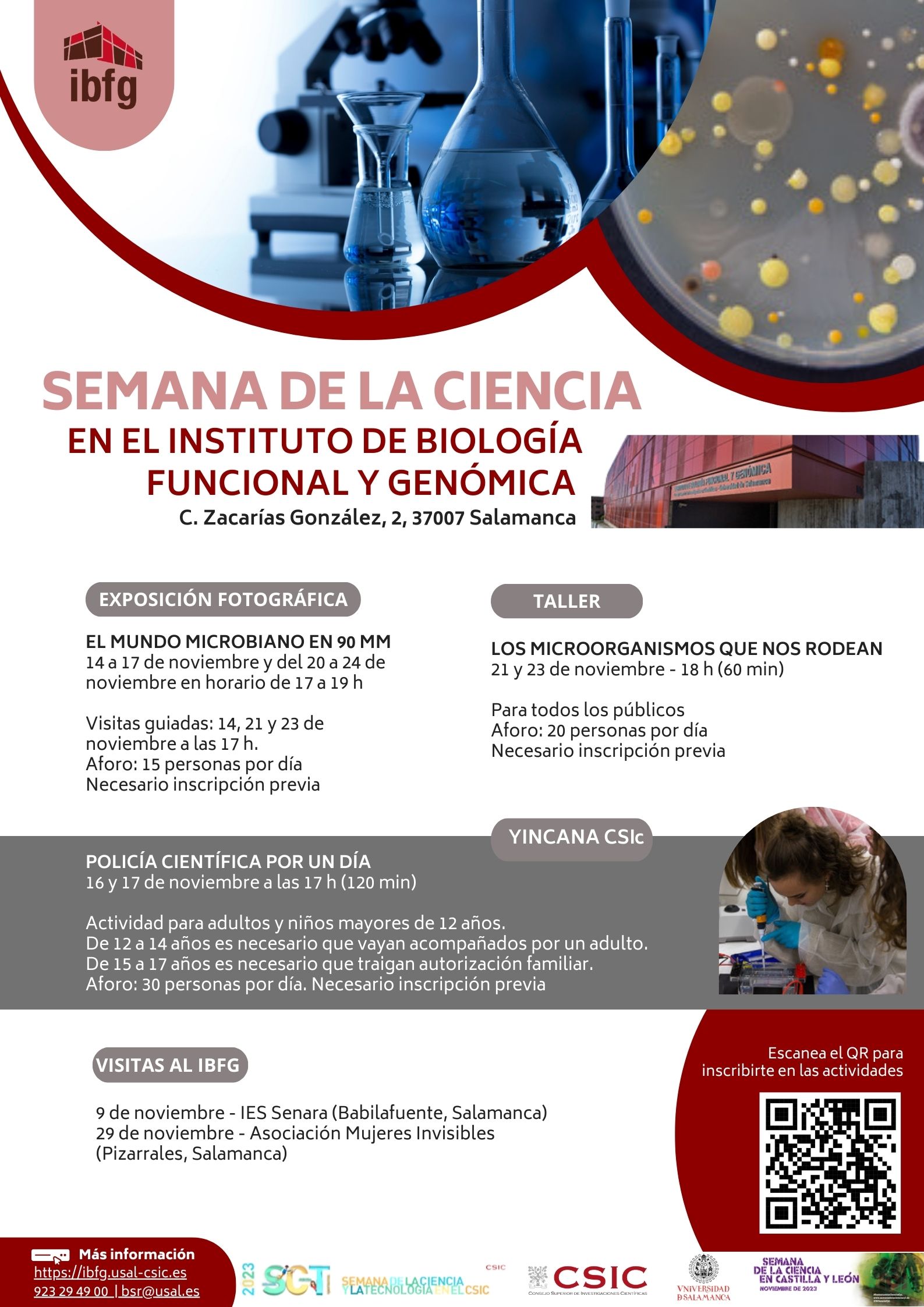
To register, click on the following link and sign up for the activity that most interests you.
November, 2023
Article by Dr. Pedro San Segundo's group on the Kudos platform about his article "Pch2 orchestrates the meiotic recombination checkpoint from the cytoplasm" published in Plos Genetics.
Article in the following link.
May, 2023
DNA repair of double-strand breaks is vital for the maintenance of genome integrity in all eukaryotic organisms. To maintain genomic stability in response to this type of DNA lesion, cells have evolved conserved and sophisticated DNA repair mechanisms that ensure the reconstitution of the DNA molecule. One of the most reliable routes to repair double-stranded breaks is the so-called homologous recombination pathway, a complex mechanism that relies on the search for a similar or identical intact DNA sequence to copy the lost genetic information.
In this article published in Nature Communication by the group of Dr. Clemente-Blanco, the authors show that protein phosphatase Cdc14 is required for DNA repair by homologous recombination. The absence of the phosphatase produces a dramatic destabilization of the broken molecule at both sides of the DNA break, that expand for thousands of nucleotides from the lesion. By using different genomics and biochemical approaches, the research group discovered that these defects lead to an inefficient DNA re-synthesis of the DNA lesion and to the incorrect distribution of the repair products generated during the recombinational DNA repair pathway. Interestingly, only mitotically activated Cdc14 promotes stabilization of the DNA lesion, suggesting that cells can enter in mitosis with unrepaired chromosomes, extending the role of DNA repair to the latest stages of the cell cycle.
This work settles the basis for the role of Cdc14 in the repair of a DNA lesion and envision new functions for the phosphatase in the control of DNA repair to safeguard genome integrity and cell viability in response to DNA damage.
Enlace al artículo en el siguiente enlace.
Mayo, 2023
Research by Cristina Viéitez, a scientist at the Institute of Functional Biology and Genomics (IBFG) in Salamanca, a joint center of CSIC and USAL, has been awarded by the L'Oréal-UNESCO 'For Women in Science' program, which this year celebrates its 25th anniversary at the international level. This program recognizes the most outstanding work of five national women researchers under the age of 40. The awards, which this year have focused on the field of Life Sciences and the Environment, are endowed with 15,000 euros and aim to highlight female leadership in the scientific field.
Aged 39 and born in El Bierzo (León), Cristina has been recognized for her research 'Systematic Study of Histone Post-Translational Modifications', which aims to understand how histone modifications are regulated, with the potential to define new therapeutic targets for the treatment of human diseases.
Thus, the work of Viéitez and his team focuses on the regulation of histones, which are the proteins that package the two meters of DNA in the microscopic nucleus of cells, forming circuits that regulate their correct functioning. Ultimately, the research seeks to understand these circuits in order to identify therapeutic targets and design more specific treatments for diseases such as cancer.
The research has been chosen by a prestigious jury made up of eminent scientific experts in the areas covered in this edition: Ángela Nieto, Group Leader of the Institute of Neurosciences CSIC-UMH and laureate in the last edition of 'For Women in Science'; María A. Blasco Marhuenda, director of the National Cancer Research Center CNIO; María Vallet-Regí, Professor of Inorganic Chemistry at the Faculty of Pharmacy of the UCM and Academician of the Royal Academies of Engineering and Pharmacy and Rafael Garesse Alarcón, Professor of Biochemistry and Molecular Biology at the Autonomous University of Madrid, of which he has been Rector until 2021.
L´Oreal Article in this link.
Diario de León Article in this link.
El País Article in this link.
Agencia SINC Article in this link.
Universidad de León Article in this link.
Europapress CyL Article in this link.
La Gaceta CyL Article in this link.
La Crónica de Salamanca Article in this link.
Salamancartvaldia Article in this link.
Cadena Ser Article in this link.
Tribuna Salamanca Article in this link.
Zamora News Article in this link.
Digital León Article in this link.
Bierzo Digital Article in this link.
InfoBierzo Article in this link.
Interempresas Article in this link.
Web de la Salud Article in this link.
El Español Article in this link.
SEBBM Article in this link.
CyL TV Article in this link.
La Sexta Article in this link.
Mujer Hoy Article in this link.
EFE Verde Article in this link.
Mujer a Seguir Article in this link.
Educar en Igualdad Article in this link.
El Diario Feminista Article in this link.
CTAEX Article in this link.
Diario Siglo XXI Article in this link.
Corresponsables Article in this link.
VivirEdiciones Article in this link.
InfoRetail Article in this link.
May, 2023
This event, open to the public, will take place on Thursday, May 4 at 18:00 in the auditorium of the Dioscorides building of the Faculty of Biology. It can also be followed live on Instagram @micromundoUSAL.
MicroMundo is an international research project to search for antibiotic-producing microorganisms and raise awareness of the problem of resistance to these compounds. In Salamanca, this project is coordinated from the Institute of Functional Biology and Genomics (IBFG). This year (6th edition) 29 university students have participated through a service-learning project and 85 students from four schools in Salamanca (IES Leonardo da Vinci, IES Calisto y Melibea, IES Federico García-Bernalt and Colegio Maestro Ávila). The results obtained will be presented at this conference.
In addition, Jessica Gil Serna from the Complutense University of Madrid will give a talk on fungi and the problem of antimicrobial resistance at the closing of the MicroMundo 2023 project.
The Unit of Scientific Culture and Innovation of the USAL and the Spanish Foundation for Science and Technology - Ministry of Science and Innovation collaborate in this event.
More information in the following image:
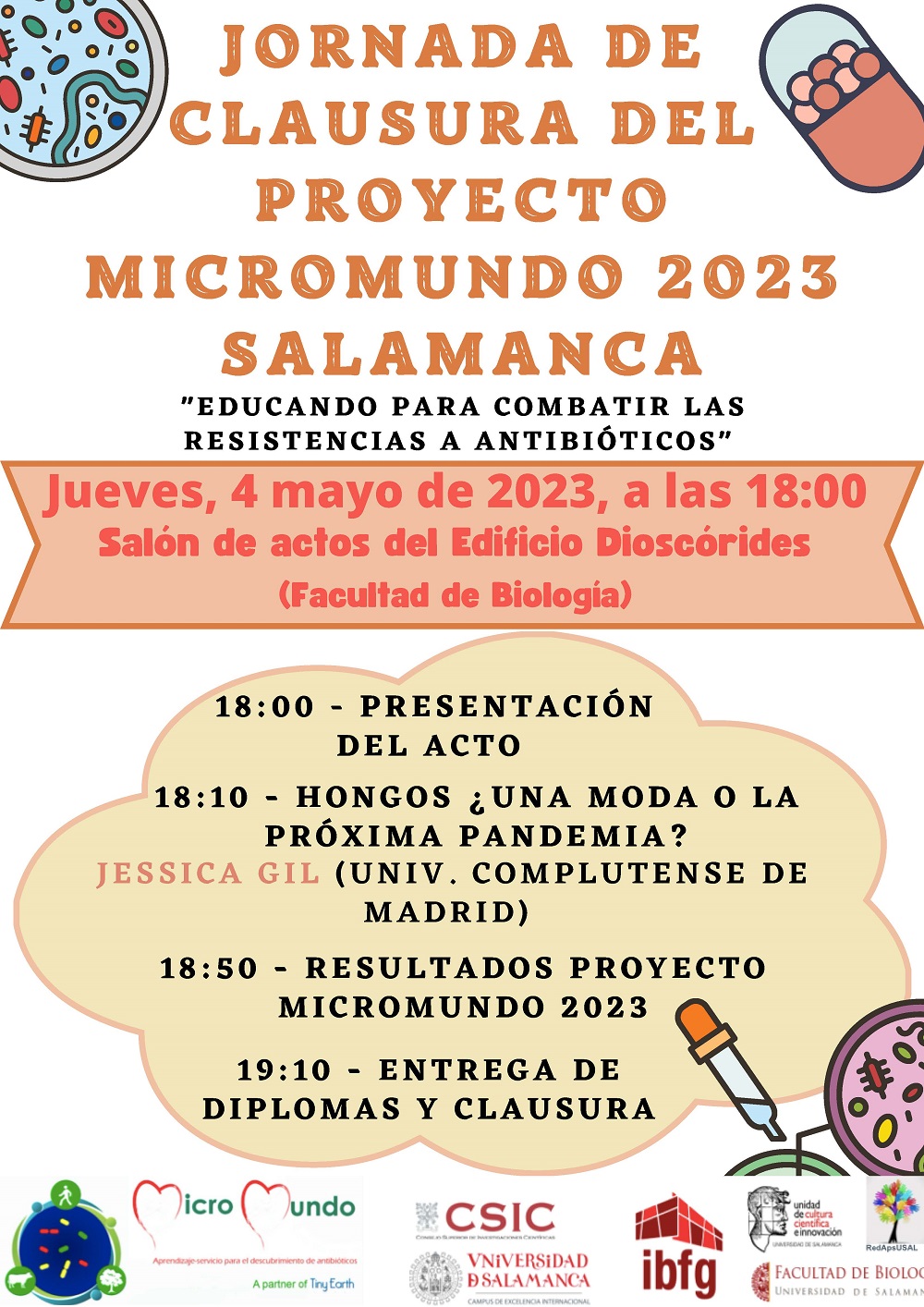
May, 2023
On April 26th, a divulgative activity took place in the Plenary Hall of the Town Hall of Alba de Tormes, Salamanca.
The activity entitled "The silent pandemic: antibiotic resistance. Antibiotics are not good for everything" consisted of an informative talk with the participation of IBFG researchers together with students from IES Leonardo daVinci and the Faculty of Biology of the University of Salamanca.
More information in the following image:
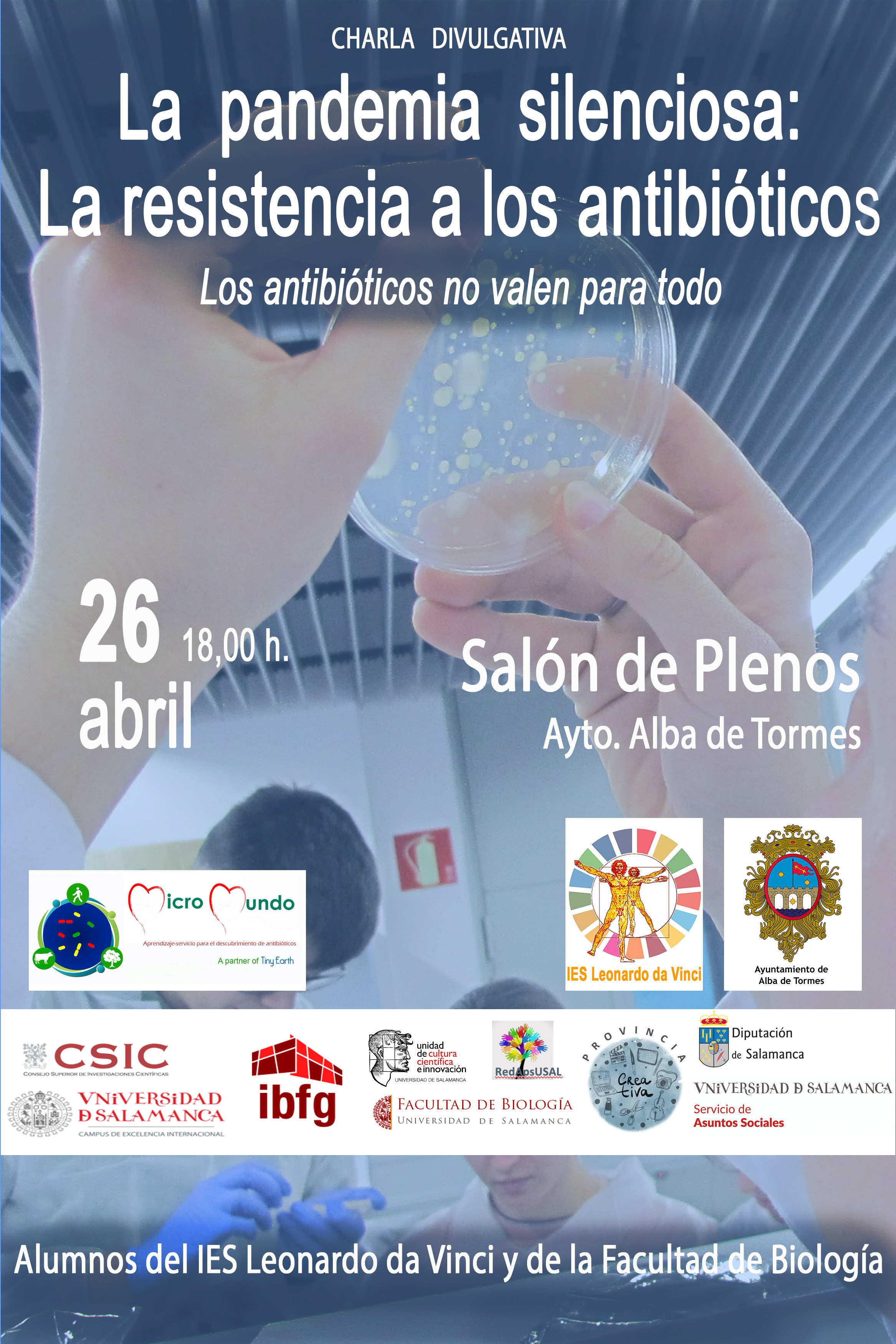
April, 2023
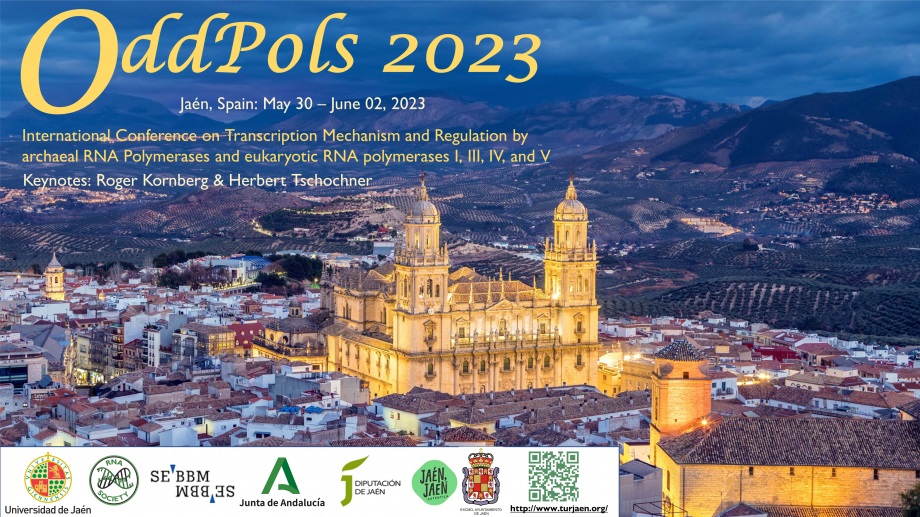
Dr. Olga Calvo, researcher and director of the IBFG, co-organizes the International Conference on Mechanisms and Regulation of Transcription 'OddPols 2023'. Initially held in the United States in 1998, only one of the twelve previous editions has taken place in Europe, while the rest have been in North America.
The congress is of a scientific nature and is framed in the field of transcription with special emphasis on RNA, a topic of particular relevance at present, for example, for its use in vaccines against Covid-19. Confirmed plenary speakers include Roger Kornberg, winner of the 2006 Nobel Prize in Chemistry for his studies on eukaryotic transcription, and Herbert Tschochner, a renowned scientist in the field of transcription and ribosome biogenesis.
This event will have a hybrid format, face-to-face and virtual. Among the more than 100 on-site attendees registered so far, there are researchers from four of the five continents, coming from prestigious institutions such as NIH (USA), Pennstate University (USA), Salk Institute (USA), Johns Hopkins University (USA), the Australian National University, the MRC (UK), the Amsterdam Cancer Institute (Netherlands), the EMBL-Heidelberg (Germany), the CNRS (France), the Shanghai Plant Institute (China), or the Institutes of Molecular Biology in Hyderabad (India) and Taipei (Taiwan).
The congress is also organized by Dr. Carlos Fernández Tornero from the CIB Margarita Salas as well as by Jorge Pérez Fernández and Francisco Navarro from the University of Jaén and David Schneider from the University of Alabama (USA). It is sponsored by the SEBBM, the RNA Society and the University of Jaén, as well as by institutions such as the Provincial Council and the City Council of Jaén.
The website is operational and registration for virtual participation is open on this link.
Abril, 2023
The Institute of Functional Biology and Genomics (CSIC-University of Salamanca) participates for the sixth time in an international initiative to search for antibiotic-producing microorganisms and address the problem of bacteria resistant.
USAL News
DICYT News
Salamancartvaldia News
Salamanca24horas News
Tribuna Salamanca News
Noticiassalamanca News
La Gaceta de Salamanca News
Tribuna Valladolid News
February, 2023
Dr. María Delgado Esteban, Professor at the University of Salamanca and researcher at the IBFG, was interviewed by the newspaper Salamanca24horas on the occasion of the celebration of the International Day of Women and Girls in Science.
Link to the interview in Salamanca24horas
February 2023
The Spanish National Research Council, through the Institute of Functional Biology and Genomics (IBFG) and the Group "Translational regulation and yeast biotechnology", contribute to NutriPanSalud (Obtaining healthy breads of high nutritional quality with plant matrices, MICROBIAN INOCULES AND INNOVATIVE TECHNOLOGICAL PROCESSES) the analysis of the sourdough microbiome, the selection of new strains of bacteria and yeasts with desirable technological properties and the formulation of new starter cultures to obtain 4 new ranges of breads, with and without gluten.
The project "NutriPanSalud" (01/10/2022 - 30/09/2025) is led by the company NOVAPAN S.L. with Dr. Mercedes Tamame as Technical Scientific Coordinator, thanks to funding from the Ministry of Science and Innovation, Plan de Recuperación, Transformación y Resiliencia, Plan Estatal de Investigación Científica, Técnica y de Innovación 2021-2023. State Program to promote Scientific and Technical Research and its Transfer. Call for Projects in Public-Private Collaboration 2021.
The project with file number CPP2021-008595 aims to develop new ranges of breads with and without gluten, with high nutritional quality and health-promoting properties. This project is a consortium of innovative companies, manufacturers of bread with gluten (Novapan) and without gluten (Amaritta) and 4 CSIC Institutes (CIB, IATA, IBFG, ICTAN). The project CPP2021-008595 has been funded by MCIN/AEI/10.13039/501100011033 and by the European Union "NextGenerationEU" / PRTR.
Total funding: 790.806,9 €
IBFG funding: 142.583 €
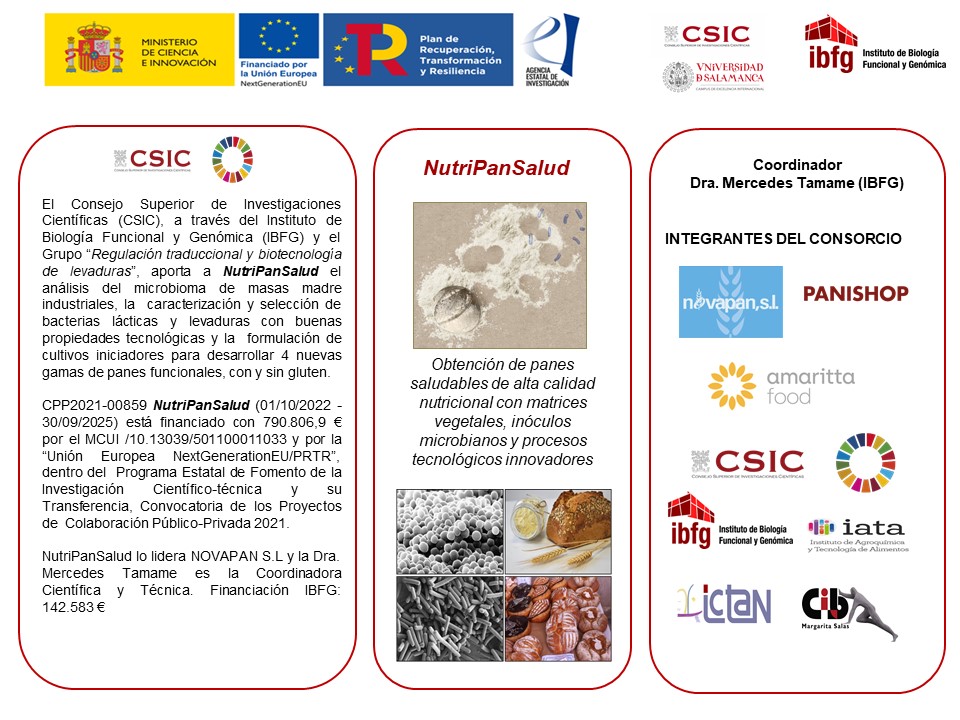
Febrero, 2023
Dr. Mercedes Tameme was interviewed by the newspaper El Mundo Castilla y León about her research at the IBFG. The interview covered the innovations in bread and wine that she has developed in various projects formed by public-private consortia and in which selected microorganisms have been used.
Febrero, 2023
The Institute of Functional Biology and Genomics (IBFG), a joint research center jointly owned by the Spanish National Research Council (CSIC) and the University of Salamanca (USAL), organizes informative and scientific activities to celebrate the international day of women and girls in science.
ONLINE ACTIVITIES
1. Online Science Trivial (Kahoot) "DNA Scientists"
Online scientific trivia aimed at students from 4th-6th grade of primary school. It will be developed telematically by Zoom and aims to introduce some of the most relevant scientists in the field of genetics and molecular biology.
We will take the opportunity to explain concepts such as DNA, RNA, vaccines, etc. in a very entertaining way through games.
Pre-registration is required.
DATES - February 16th and 23rd at 12:00 h. One of the two days must be chosen on the registration form. Limited places.
SOCIAL MEDIA OUTREACH ACTIVITY
1. Meet the Women Scientists who influenced IBFG's Research
. Activity that will take place from February 10 to March 8 and aims to disseminate in our social networks of those scientists who influenced the research carried out at the IBFG..
ACTIVITIES IN EDUCATIONAL CENTERS
1. Interactive Science Talk "On the trail of women researchers who save lives".
This is an interactive scientific talk that will take place at the CEO Alto Alagón (Linares de Riofrío).
It will consist of a didactic and interactive talk in search of scientific curiosity. Through dynamic questions and answers and brief presentations, we will learn about research carried out by scientists who have been, are and will be determinant in the field of health.
DATE - February 22nd at 12:00 h.
2. Interactive Science Workshop "Diverciencia IBFG".
Science workshop to be held at CEIP Armuña (Pedrosillo el Ralo).
This is a workshop on the work of scientists. The students will play a game with tests. They will learn what science is, what the profession of scientist consists of and they will meet scientists from the IBFG.
DATE - March 8th at 11:00 h.
ACTIVITIES AT IBFG
1. Coffee-talk with women scientists "What do IBFG women scientists research?"
Activity where, over coffee, you can chat with some IBFG researchers. They will explain what their work and research consists of. You will be surprised.
DATE - March 2nd at 5:00 h. Registration is required. 2. Microbiology workshop "Molding microorganisms".
Activity for children from 6 to 10 years old where they can learn about microorganisms. In addition, they will be able to make their own microorganisms with plasticine.
DATE - March 2nd at 5:00 h. Registration is required. ACTIVITY FOR IBFG STAFF
1. Round Table-Colloquium "An intelligent and fair science is everybody's business"
Colloquium aimed at IBFG staff in training, predoctoral and postdoctoral, led by Marta Bueno, physicist, educator and regular contributor to the blog Mujeres con Ciencia. Marta proposes a reflection on equity in the STEM field: do we think that women have the same opportunities in a scientific career, do we really believe that we can ignore the support of colleagues to achieve changes, do we see the advantages of having different perspectives in our teams? From an inclusive perspective, inertia, stereotypes and prejudices that hinder the advancement of an intelligent, critical and honest science will be put on the table.
DATE - February 14th at 12:00 h.
SCIENTIFIC ACTIVITIES AT IBFG
1. Seminar by Aurora Martín Najera
Scientific seminar by Aurora Martín Najera, director of the Atapuerca System and the Museum of Human Evolution in Burgos), entitled "Atapuerca: investigating, interpreting, socializing scientific knowledge" (Atapuerca: investigating, interpreting, socializing scientific knowledge).
The talk will focus on the relevance and potential of the Atapuerca sites in the study of human evolution; and on the Museum of Human Evolution, key in the transmission of scientific knowledge in this area to society.
DATE - February 10th at 12:30 h.
2. Seminar by Carmen García Martínez
Scientific seminar by Carmen García Martínez, director of the Spanish Institute of Oceanography in Malaga, entitled "Marine Sciences and Women of the Sea".
The talk will focus on the research carried out at the IEO and on the educational project "Oceánicas", which aims to show female references in this field and make their work visible.
DATE - February 17th at 11:30.
3. Seminar by Ainhoa Martínez Medina
Scientific seminar by Ainhoa Martínez Medina, researcher at the Institute of Natural Resources and Agrobiology of Salamanca (IRNASA-CSIC, whose title is "Root mutualistic symbionts: plant allies in a multitrophic context".
The talk will focus on the lines of research being carried out in his laboratory.
DATE - March 3rd at 12:30 h.
February/March, 2023







